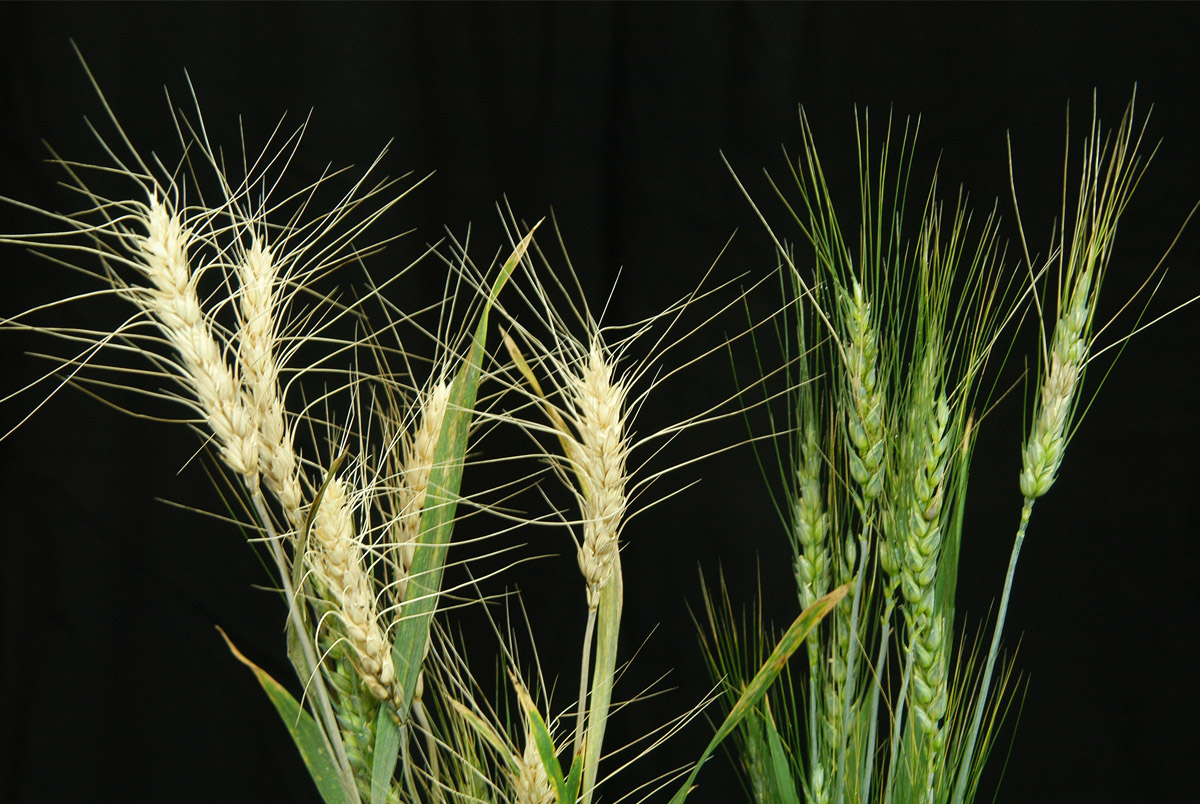
International Research Team Discovers Gene to Develop Fusarium Head Blight Resistant Wheat
April 15, 2020| |
Researchers from the U.S. Department of Agriculture Agricultural Research Service (USDA ARS) and colleagues from Shandong Agricultural University in China have discovered a gene that can be used in the development of wheat varieties with more resistance to Fusarium Head Blight (FHB), a disease that is a major threat to wheat crops worldwide. FHB shrivels grain and can significantly decrease harvests of wheat and barley. Worse, the toxins released by the fungus Fusarium graminearum, a growing problem in the breadbaskets of Europe, North America, and China, remain in grain intended for food.
The researchers published their discovery and the cloning of the gene, known as Fhb7 in the journal Science. Fhb7 was found in Thinopyrum wheatgrass, a wild relative of wheat previously used to develop varieties of wheat with beneficial traits, such as rust resistance and drought tolerance. The research team found that the gene effectively reduces FHB by detoxifying the mycotoxins secreted by the pathogen. The gene also confers resistance to crown rot, a wheat disease caused by a related pathogen.
They cloned the gene and introduced it into seven wheat cultivars with different genetic profiles to study its effects on plants grown under field conditions. The results showed that the gene not only conferred resistance to scab in the new plants, but it also had no negative effects on yield or other significant traits.
For more details, read the news releases from USDA ARS and Science.
| |
You might also like:
- ARS Scientists Identify Key Gene in Wheat to Help Resist Fusarium Head Blight
- Scientists Identify Gene to Fight Wheat Scab
- Cause of Wheat Resistance to Scab Discovered
Biotech Updates is a weekly newsletter of ISAAA, a not-for-profit organization. It is distributed for free to over 22,000 subscribers worldwide to inform them about the key developments in biosciences, especially in biotechnology. Your support will help us in our mission to feed the world with knowledge. You can help by donating as little as $10.
-
See more articles:
-
News from Around the World
- International Research Team Discovers Gene to Develop Fusarium Head Blight Resistant Wheat
- Five Countries Produce More than 90% of Biotech Crops Worldwide
- FSANZ Says New GM Soybeans Safe, Invites Public for Comments
- Rothamsted Research Makes Breakthrough in Fight Against Weeds
- Plant-based Tuna Rolls Out for Sushi Lovers
-
Research Highlights
- New Source of Powdery Mildew Resistance Found in Wild Wheat
- Vitamin E-enriched Sweet Corn Developed
-
Plant
- Gene Editing Could Yield Herbicide Tolerant, Non-GM Soybeans
- Cas-CLOVER, an Alternative to CRISPR-Cas9
-
Health
- Researchers in Spain Use Biotech to Produce SARS-CoV-2 Vaccine in Plants
-
Read the latest: - Biotech Updates (February 11, 2026)
- Gene Editing Supplement (January 28, 2026)
- Gene Drive Supplement (February 22, 2023)
-
Subscribe to BU: - Share
- Tweet

